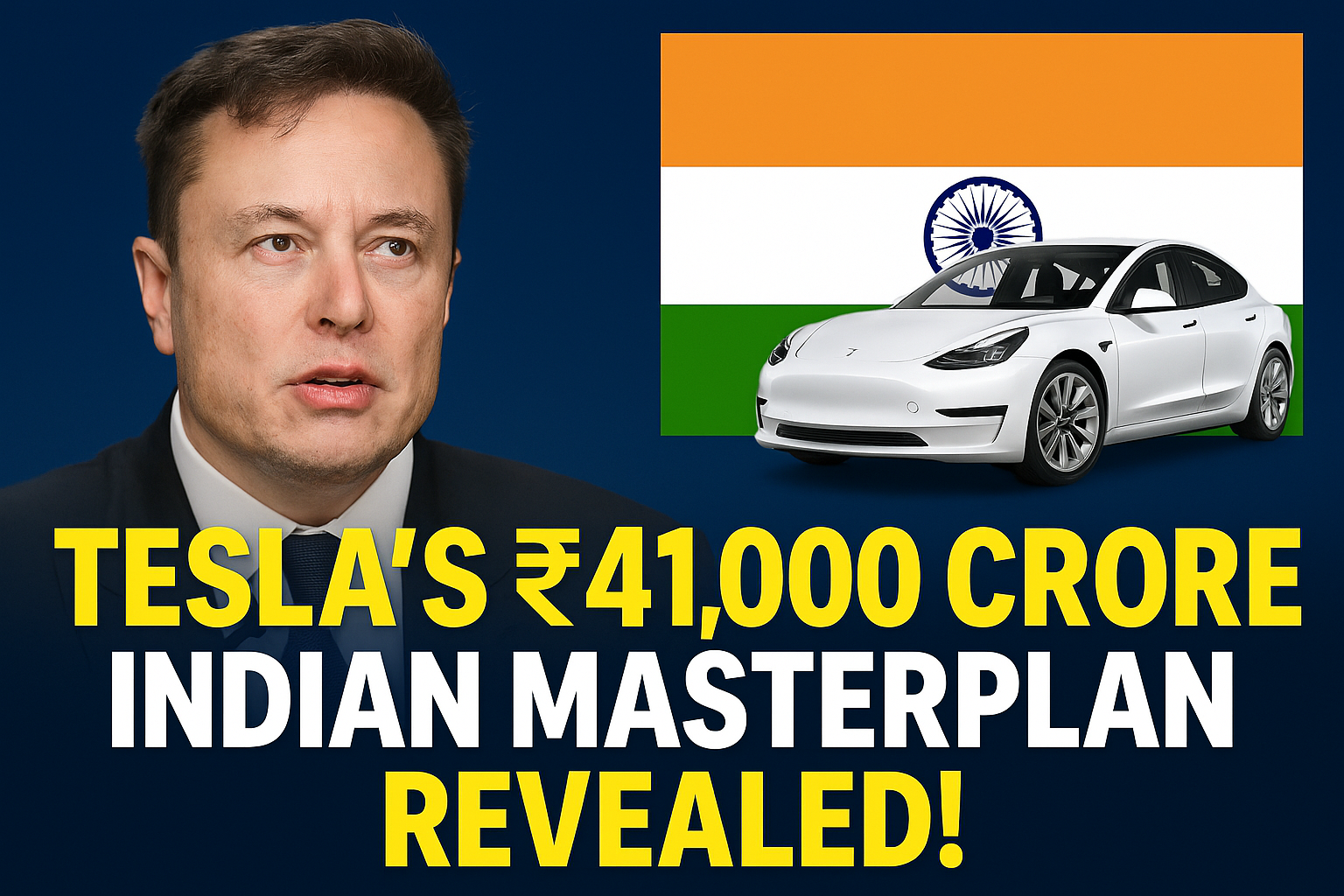Introduction
Elon Musk is making a move that a lot of Indians have been waiting for! Tesla is set to make its long-awaited entry into India, initiating recruitments and securing its first showroom space in Mumbai. On top of this, they are expected to invest more than ₹41,000 crores to disrupt India’s EV market. This move came just weeks after a meeting between Elon Musk and PM Modi, and it has even made Donald Trump a little angry, calling it unfair.
But why is Tesla so obsessed with entering India? What will be different this time from previous attempts? Will Tesla manufacture locally or just import and sell? Most importantly, how will this impact the Indian economy and businesses? Let’s break it all down.
Tesla’s Entry into India
Tesla has signed a 5-year lease for a showroom in BKC, Mumbai, and the next one is expected to be in Aerocity, Delhi. But why does the biggest EV company in the world need India?
The answer is simple: Tesla is not having the best time globally. Their share prices have dropped by more than 50%, and they are facing increasing competition in their biggest markets, the US and China. Tesla’s market share in the US has dropped from 55% in 2023 to 49% in 2024, and in China, they only hold 4% of the market. European sales are also declining.
India, however, presents a huge opportunity. As the world’s third-largest automobile market, India has ambitious EV adoption goals. The country aims to have 30% of all cars sold be electric by 2030, backed by policies and subsidies like PLI and FAME. Premium car sales are also rising, making India a potential revenue driver for Tesla.
Challenges and Policy Changes
For years, India imposed a 110% import duty on US-manufactured cars costing over $35,000. This meant that a $40,000 Tesla would cost around $84,000 in India, making it unaffordable for most consumers. However, recent policy changes have reduced import duties to 15%, but with conditions:
- Companies must invest at least $500 million (₹4,100 crores) and set up a local factory within three years.
- They must meet a 25% domestic value addition target initially and increase it to 50% within five years.
- Companies can then import up to 80,000 cars into India.
While this aligns with India’s goal of promoting local manufacturing, Tesla is currently taking a cautious approach. Reports suggest that they will initially test the market with imported vehicles from Germany before committing to full-scale production in India.
Impact on the Indian Economy and Businesses
Tesla’s entry into India could have several positive impacts:
- Job Creation: Tesla has already been sourcing auto components from India, worth $1 billion in 2023 alone. If they expand manufacturing here, it could generate thousands of skilled jobs.
- Upskilling of Workforce: Just like Foxconn’s iPhone assembly in India created over 40,000 jobs, Tesla’s local operations could drive similar growth in the EV sector.
- Boost to Supporting Industries: Tesla’s presence could enhance India’s reputation as a global manufacturing hub, benefiting suppliers, logistics, and infrastructure development.
- Increased Innovation: Tesla’s advanced technology and ecosystem will push Indian EV manufacturers like Tata Motors, Mahindra, and Ola Electric to innovate and improve their offerings.
The Road Ahead for Tesla in India
While Tesla’s initial sales in India will rely on imported cars, the long-term plan could include local manufacturing. Maharashtra is currently the leading contender for Tesla’s plant, given its established automotive ecosystem. However, Tesla will need to address several challenges, including charging infrastructure and regulatory hurdles for self-driving technology.
That said, Tesla’s entry won’t disrupt the mass EV market immediately, as its vehicles remain in the premium segment. The best-selling EV in India today is the Tata Punch, an affordable alternative for most consumers. Instead, Tesla’s presence will accelerate industry growth and infrastructure development, benefiting the entire ecosystem.
Conclusion
Tesla’s planned investment in India is a significant step for the country’s EV industry. While initial operations will focus on imports, the potential for local manufacturing could transform the market, create jobs, and boost the economy. Whether or not Tesla sets up a factory in India, their entry will undoubtedly drive competition and innovation in the Indian EV space.
FAQs
1. Why is Tesla entering the Indian market?
Tesla is looking for new growth opportunities as its sales decline in major markets like the US and China. India’s growing automobile market and government support for EVs make it an attractive destination.
2. Will Tesla manufacture cars in India?
Tesla has not officially confirmed local manufacturing but has agreed to invest ₹41,000 crores if demand meets expectations. For now, they will import vehicles from Germany.
3. How will Tesla’s entry benefit India?
Tesla’s presence will create jobs, drive innovation, boost local manufacturing, and encourage EV adoption in India.
4. What models will Tesla launch in India?
Tesla plans to launch the Model 3 and Model Y in India, targeting the premium segment.
5. Where will Tesla set up its first showroom in India?
Tesla has secured a showroom in BKC, Mumbai, and is planning another in Aerocity, Delhi.
Tesla’s move into India is just the beginning of an exciting journey for the country’s EV sector. What are your thoughts on Tesla’s Indian entry? Let us know in the comments!










